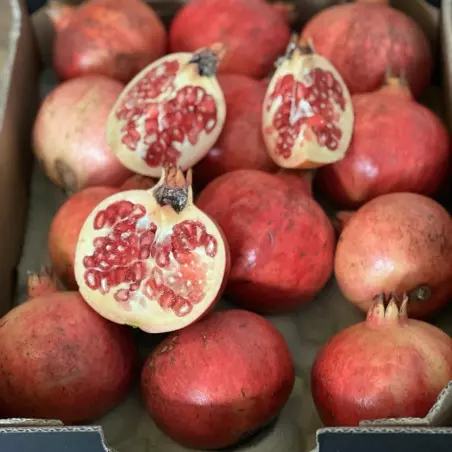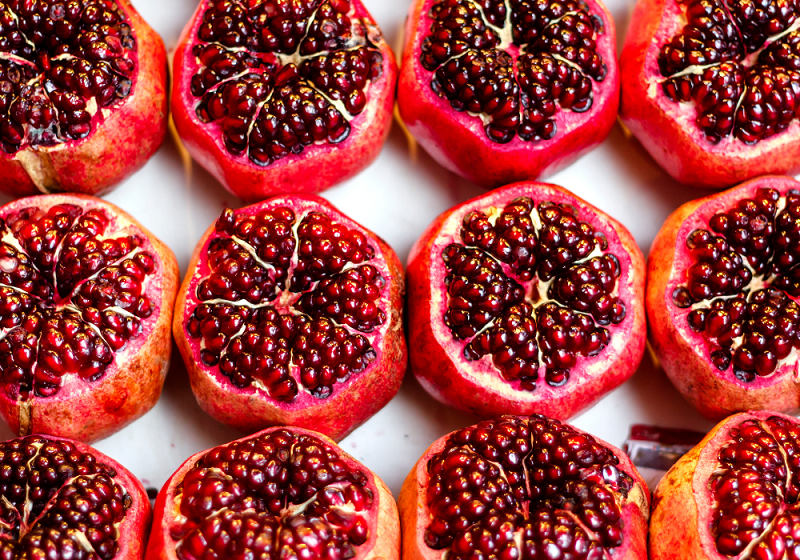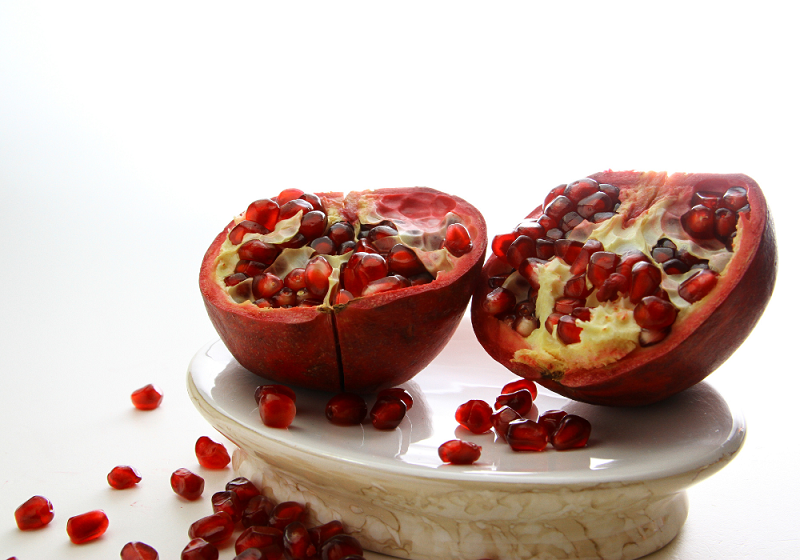It is pomegranate season, a fruit native to the Mediterranean basin where it is found from October to March in most producing countries. In this region, you can find both pomegranate orchards and wild pomegranate trees along roads and paths, making it a staple fruit for travelers. This fruit tree with deep red flowers has been revered throughout history for its medicinal properties and is now recognized by scientific research for its antioxidant action and numerous health benefits. For those who do not live around the Mediterranean, it is possible to easily obtain organic pomegranates from small organic producers located in the Costa Tropical in Spain, like our producer Iulian, and make fresh, unpasteurized organic pomegranate juice at home.See our article on the subject, and how to peel an organic pomegranate in less than 30 seconds. without being bothered by its white membranes) to benefit from all the nutrients present in this fruit and its various nutritional qualities. Indeed, bottled fruit juice will not contain the valuable active ingredients destroyed by high-temperature pasteurization, which are preserved in the form of freshly pressed homemade pomegranate juice.
A fruit omnipresent in the culture of Mediterranean countries
His Latin name, Punica granatum, refers to its historical origin in Persia, and its image is woven into the fabrics of many cultures and religions around the world. In Greek mythology, the pomegranate (sometimes also called the pomegranate apple) is often associated with Persephone and her forced marriage to Hades, symbolizing the cycle of life, death, and renewal. The juicy seeds of the pomegranate were considered symbols of fertility, prosperity, and abundance.
In Judaism, the pomegranate is a symbol of righteousness, with its 613 small edible seeds corresponding to the 613 commandments of the Torah, representing the fullness of the law and the abundance of wisdom. Pomegranates are often carved on ancient altars and Torah scrolls, highlighting their importance in Jewish tradition.
In Islam, the pomegranate is also highly esteemed. It is mentioned in the Quran as an example of a delicious fruit that grows in the gardens of paradise, and it is consumed for its health benefits, which have been recognized for centuries by traditional Islamic medicine.
In Ayurvedic medicine, pomegranate seeds have been used for millennia for disease prevention and the treatment of various ailments, such as digestive disorders, infections, inflammatory diseases, and neurological conditions. It is the emblematic fruit of good health. Its richness in tannins makes it an effective astringent, and its properties are still utilized in contemporary health practices in India, where the consumption of fresh pomegranate juice is common.
In our modern Western culture, the pomegranate seed has been rediscovered and is often referred to as a "superfruit." It is praised for its antioxidant properties and its potential to combat various diseases.
The health benefits of organic pomegranate, rooted in tradition and confirmed by modern science, make it a top-choice fruit.
We are going to explore the seven main health benefits of consuming pomegranate.
1. Rich in antioxidant nutrients
Organic pomegranates, a source of vitamin C and flavonols, are powerful antioxidants (and also contain vitamin B6 and vitamin B9) whose protective effects are well-established. They are also loaded with potent natural antioxidants, particularly punicalagins and ellagic acid, which have positive effects. Indeed, the high content of these compounds in pomegranates, which gives them a tart taste, helps protect cells against damage from free radicals and oxidative stress, and can reduce inflammation in the body. [1]. These stresses have a direct impact on the aging of cells. On the other hand, to compare with other antioxidant drinks, a study showed that pomegranate juice had three times more antioxidant activity than green tea.[2].
2. Reduction of blood pressure in the blood vessels
Regular consumption of pomegranate and pomegranate juice has been associated with a direct beneficial effect on blood circulation by inducing a reduction in blood pressure, a major risk factor for coronary heart disease. A meta-analysis revealed that pomegranate could have a hypotensive effect, particularly in patients suffering from hypertension.[3]. Another study examined the effects of pomegranate on blood flow, vessel diameter, and exercise performance in active individuals. The study included 19 men and women and found that the consumption of pomegranate extract significantly increased blood flow 30 minutes after ingestion, compared to a placebo. Additionally, the vessel diameter was significantly larger after exercise when participants had consumed pomegranate. Pomegranate ingestion also significantly increased the time to exhaustion during a treadmill run at 90% and 100% of maximum speed. [4]
3. Improvement of heart health and blood flow
Organic pomegranate can improve heart health by positively influencing the blood lipid profile and cholesterol levels, facilitating the circulation of red blood cells. Scientific studies have suggested that consuming pomegranate can reduce LDL (bad) cholesterol and increase HDL (good) cholesterol. [5], thus combating cardiovascular diseases. Additionally, it can help prevent the oxidation of LDL cholesterol due to its antioxidant content, a key factor in the development of atherosclerosis.[6].
Moreover, this fruit can improve cardiovascular health not only through its influence on the lipid profile but also through its potential interaction with polyunsaturated fatty acids in the body. Although it is not a direct source of polyunsaturated fatty acids, its consumption can affect lipid metabolism and promote a bodily environment that maximizes the beneficial effects of polyunsaturated fatty acids on cholesterol and cardiovascular health. The antioxidants present in pomegranate, such as punicalagins, can help protect polyunsaturated fatty acids from oxidation, thereby allowing these essential fatty acids to maintain their structural and functional integrity in cell membranes, including those of heart cells.[5].
By supporting the function of PUFAs, pomegranate plays an indirect but significant role in promoting heart health, complementing a diet rich in polyunsaturated fatty acids from plant sources such as flax seeds, chia seeds, sunflower seeds (ideally sprouted), nuts, spirulina, and klamath algae.
The pomegranate thus contributes to an overall reduction in systemic inflammation, a known risk factor for cardiovascular diseases. [6].
4. Potential Anticancer Effects
Research indicates that compounds in pomegranate may exert anticancer effects, particularly against prostate and breast cancer. Punicalagins (punicic acid) have demonstrated their ability to inhibit the proliferation of cancer cells and induce apoptosis (programmed cell death).[7].
5. Improvement of memory and cognitive functions
The consumption of pomegranate could also have beneficial effects on memory and cognitive functions. A study showed that elderly individuals with memory problems who had a daily intake of pomegranate juice exhibited significant improvements in verbal and visual memory tests. [8].
6. Anti-inflammatory effects of pomegranate
The anti-inflammatory properties of pomegranate can be particularly beneficial for people suffering from chronic inflammatory diseases, such as rheumatoid arthritis. Studies have shown that pomegranate extract can block the action of enzymes that contribute to joint inflammation.[9].
7. Potential in diabetes treatment
Although rich in fructose, pomegranate does not appear to have the same negative effects on blood sugar levels as other fruits. Studies suggest that pomegranate may offer benefits for diabetic patients by reducing insulin resistance and lowering blood glucose levels.[10].
8. Antimicrobial effect
Pomegranate, thanks to its bioactive components, has demonstrated significant antifungal and antibacterial effects. A study published in Plants (Basel) highlighted the effectiveness of an extract from its tough exocarp (LEP) against various pathogens, such as bacteria like Escherichia coli and Bacillus megaterium. These antimicrobial properties show that pomegranate is a valuable ally in the fight against oral infections, including gingivitis, periodontitis, and dental stomatitis, by helping to neutralize infections and promote oral health.[11].
Scientific References used in this article:
[1] Gil, M. I., Tomás-Barberán, F. A., Hess-Pierce, B., Holcroft, D. M., & Kader, A. A. (2000). Antioxidant activity of pomegranate juice and its relationship with phenolic composition and processing. Journal of Agricultural and Food Chemistry, 48(10), 4581-4589.
[2] Aviram, M., Dornfeld, L., Rosenblat, M., et al. (2000). Pomegranate juice consumption inhibits serum angiotensin converting enzyme activity and reduces systolic blood pressure. Atherosclerosis, 158(1), 195-198.
[3] Sahebkar, A., Ferri, C., Giorgini, P., et al. (2017). Effects of pomegranate juice on blood pressure: A systematic review and meta-analysis of randomized controlled trials. Pharmacological Research, 115, 149-161.
[4] Trexler, E. T., Smith-Ryan, A. E., Melvin, M. N., Roelofs, E. J., & Wingfield, H. L. (2014). Effects of pomegranate extract on blood flow and running time to exhaustion in healthy adults. Journal of the International Society of Sports Nutrition, 11(Suppl 1), P4
[5] Aviram, M., & Dornfeld, L. (2001). Pomegranate juice consumption inhibits serum angiotensin converting enzyme activity and reduces systolic blood pressure. Atherosclerosis, 158(1), 195-198.
[6] Rosenblat, M., Hayek, T., & Aviram, M. (2006). Anti-oxidative effects of pomegranate juice (PJ) consumption by diabetic patients on serum and on macrophages. Atherosclerosis, 187(2), 363-371.
[7] Kim, N. D., Mehta, R., Yu, W., et al. (2002). Chemopreventive and adjuvant therapeutic potential of pomegranate (Punica granatum) for human breast cancer. Recherche et traitement du cancer du sein, 71(3), 203-217.
[8] Bookheimer, S. Y., Renner, B. A., Ekstrom, A., et al. (2013). Pomegranate juice augments memory and FMRI activity in middle-aged and older adults with mild memory complaints. Médecine Complémentaire et Alternative Fondée sur des Preuves, 2013.
[9] Hadipour-Jahromy, M., & Mozaffari-Kermani, R. (2010). Chondroprotective effects of pomegranate juice on monosodium iodoacetate-induced osteoarthritis of the knee joint of mice. Phytotherapy Research, 24(2), 182-185.
[10] Banihani, S., Swedan, S., & Alguraan, Z. (2013). Pomegranate and type 2 diabetes. Nutrition Research, 33(5), 341-348.
[11] Elshafie, H. S., Caputo, L., De Martino, L., Sakr, S. H., De Feo, V., & Camele, I. (2021). Study of Bio-Pharmaceutical and Antimicrobial Properties of Pomegranate (Punica granatum L.) Leathery Exocarp Extract. Plants (Basel), 10(1), 153.








